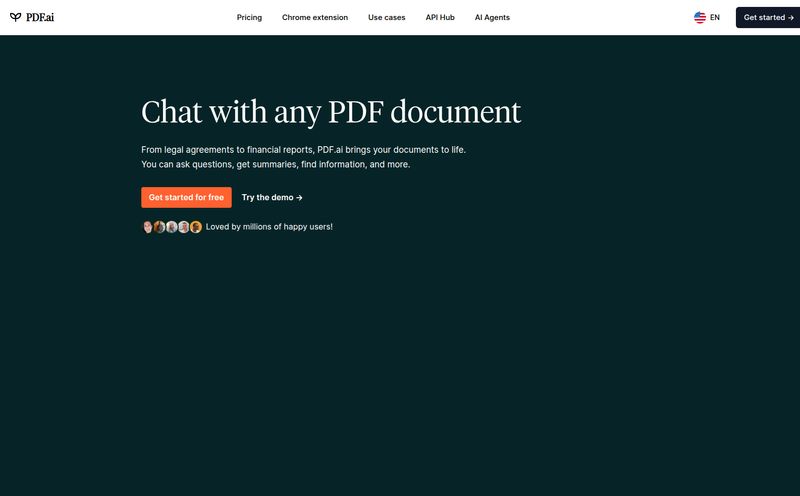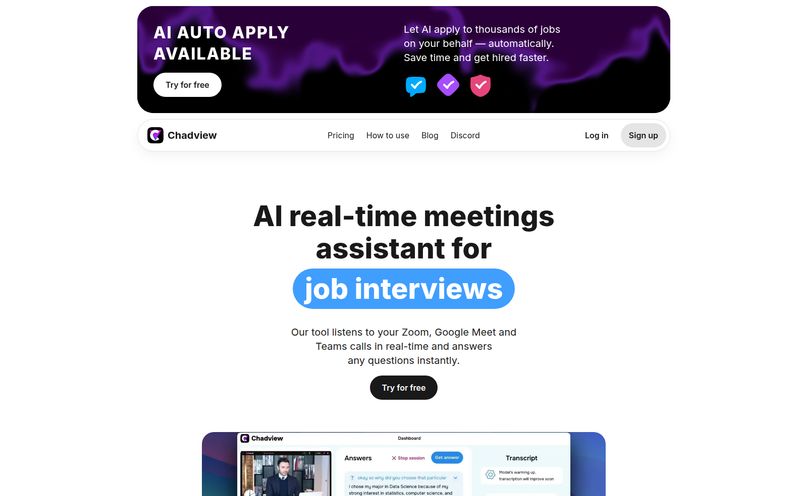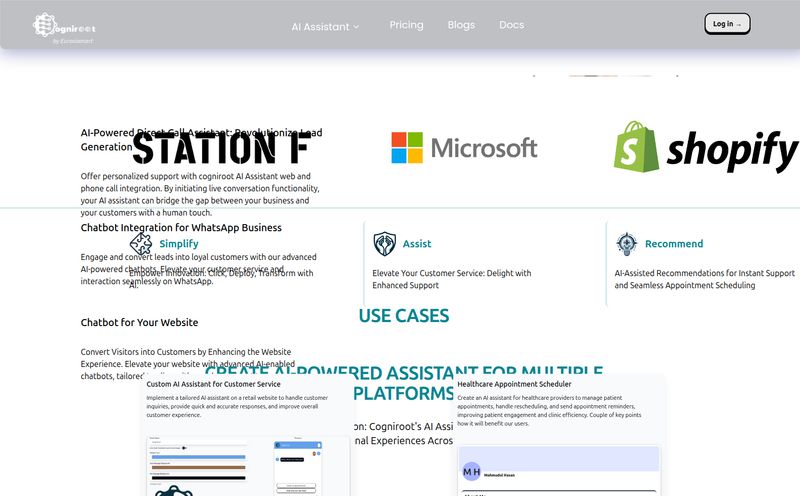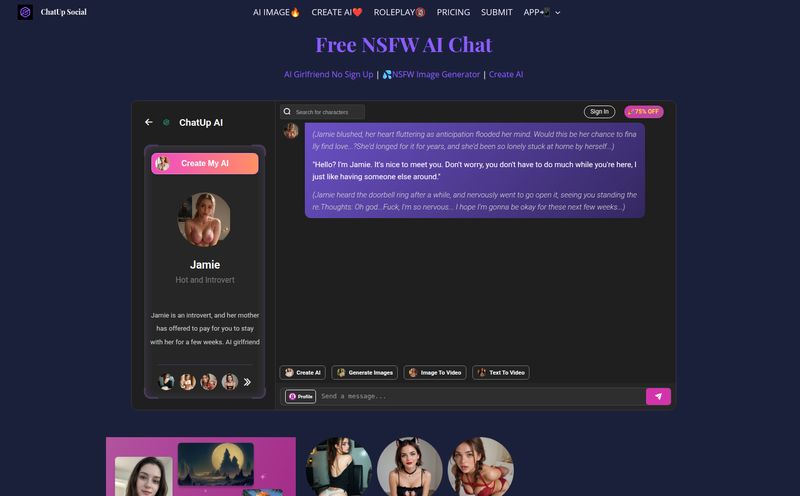I still have mild PTSD from a group interview I did back in my early twenties. You know the one. Ten nervous candidates crammed into a conference room, all vying for one spot, trying to sound smart while someone else is talking over them. It was chaotic, inefficient, and I left feeling like I never even got a chance to make a real impression. We've all been there, right? On one side of the table or the other.
For years, the hiring process has been this clunky, time-consuming dance. Phone screens, scheduling nightmares, no-shows... it's a grind. Then came the shift to video calls, which solved the geography problem but created its own brand of awkwardness (we've all stared at our own face a little too much on Zoom). Now, we’re at the next frontier: AI-powered interviews. And I have to admit, my inner skeptic raised an eyebrow.
But as someone who lives and breathes digital trends and traffic, I know you can't ignore a wave just because you're not sure you want to surf it. So I decided to take a look at one of the newer players in this space: Screenle. Is it just another piece of tech promising to revolutionize everything, or is there something genuinely useful here? Let's get into it.
So, What on Earth is Screenle?
At its core, Screenle is an AI-powered job interviewing platform. But let's ditch the jargon. Think of it less like a live video call and more like a pre-recorded audition where the casting director is a friendly AI. It serves two distinct audiences, which is the first thing that caught my eye. It’s a tool for companies to screen candidates, but it's also a practice arena for job seekers.
The process is simple: a company creates an interview with custom or AI-generated questions. They send a link to a candidate. The candidate, on their own time, records their answers to the questions posed by an AI avatar. The platform then analyzes the whole thing – video, audio, what was said, even facial expressions – and gives the recruiter a neat little report. It's asynchronous, it's standardized, and it's… well, it’s very different.
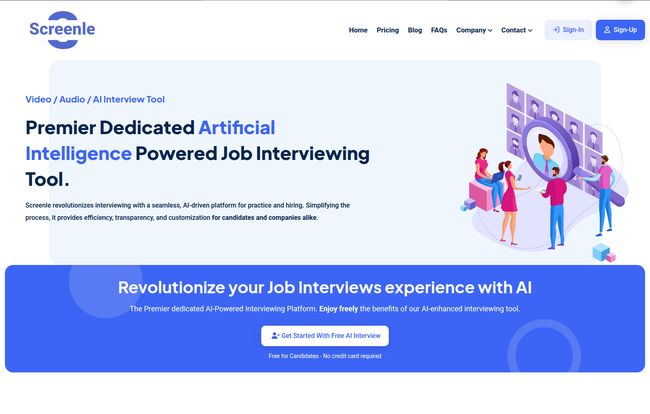
Visit Screenle
For the Job Seekers: Your New AI Interview Coach
Okay, let's start with the side of this I'm most excited about. For anyone who gets the pre-interview jitters, Screenle could be a legitimate game-changer. For too long, the only way to get good at interviews was… by doing interviews. And probably bombing a few along the way.
Screenle offers a practice mode. You can face off against an AI interviewer, get a feel for the pacing, and work out the kinks in your answers before you're in front of your dream company. The platform provides AI-driven feedback, which is fascinating. It supposedly analyzes your answers and gives you pointers. This is like having a career coach on-demand, ready to run drills with you at 2 a.m. if that's when your inspiration strikes.
And here’s the kicker: for job seekers, it’s free. You get 10 credits a month to practice, get feedback, and even use their AI-powered tools to help generate cover letters. That’s a pretty low barrier to entry for leveling up your job-hunting skills.
For the Recruiters: Finally, a Way to Cut Through the Noise
Now let's flip the script. If you're a hiring manager, your biggest headache is often volume. You get 200 applications for one role, and you know there are gems hidden in that pile, but how do you find them without spending your entire week on phone screens? This is the problem Screenle aims to solve.
By sending out a Screenle link, you can effectively conduct a first-round interview with dozens of candidates without having to schedule a single call. You get to see and hear them, but on your own time. You can watch the recordings at 1.5x speed (we all do it with voicemails, let's be honest) and quickly get a sense of a candidate's communication style and thought process. The AI analysis provides a transcript and a summary, making it easy to compare apples to apples.
One of the most interesting features is the AI-Powered Avatar Interviewers. You can choose from a diverse cast of characters to ask the questions. The idea here is to remove unconscious bias from the equation. The avatar won't react differently based on a candidate's appearance or accent; it delivers the same questions in the same tone to everyone. It’s a bold attempt to standardize the initial screening process, and I have to give them credit for tackling that head-on.
Let's Talk Brass Tacks: The Screenle Pricing Model
Alright, so how much does all this futuristic tech cost? I was pleasantly surprised by the straightforwardness of their pricing, which is a breath of fresh air.
As I mentioned, the best things in life are free, and for Job Seekers, Screenle is exactly that. You get your 10 monthly credits, access to AI coaching, and the cover letter generator without ever pulling out a credit card. No strings attached.
For companies, there are two main tiers. The Basic plan is $10 per month. This gets you 50 credits, which is likely enough for a small business or a startup doing occasional hiring to screen a solid number of candidates. You get access to all the core features, including the AI-powered interviews and feedback.
If you're in a more serious growth phase, the Pro plan at $50 per month is probably your go-to. This plan is unlimited. Unlimited interviews, unlimited candidates, unlimited access to all features, plus things like CV and job assessment tools. For an active HR department, that's a very competitive price point. And of course, they have the classic “contact us for a custom quote” for large enterprises that need special integrations or support.
The Good, The Bad, and The AI
No tool is perfect. As a seasoned SEO pro, I know that every platform has its strengths and its, let's say, areas for growth. Here’s my breakdown.
The Upside of AI Screening
The efficiency is undeniable. For high-volume roles, this could literally save hundreds of hours. The consistency is also a huge plus; it helps create a more level playing field at the start. But for me, the biggest pro is the empowerment it gives to candidates through the practice mode. That alone is a fantastic contribution to the often-lopsided hiring dynamic.
The Potential Pitfalls
Now, let's be real. Relying solely on AI to judge a human is a slippery slope. My biggest concern is the nuance an AI might miss. A candidate who is brilliant but a bit awkward on camera might get unfairly filtered out. Can an algorithm truly measure passion, creativity, or that hard-to-define “culture fit”? I have my doubts.
Then there’s the bias question. While AI avatars are meant to reduce bias, the algorithms themselves are trained on data. If that data has inherent biases, the AI will learn them. It’s the classic “garbage in, garbage out” problem that the entire tech industry is grappling with. And finally, there's the digital divide. What about a stellar candidate in a rural area with spotty internet? Or someone who doesn't have a laptop with a webcam? It’s a barrier to entry that we can’t just ignore.
My Final Verdict on Screenle
So, do I think you should drop everything and move your entire hiring process to Screenle? Not necessarily. But do I think it's a powerful and incredibly useful tool? Absolutely.
I see Screenle not as a replacement for human recruiters, but as a powerful assistant. It’s the ultimate filter. Use it for that initial, wide-net screening to identify a strong pool of qualified candidates. It can handle the heavy lifting, freeing you up to spend your valuable time on meaningful, in-depth conversations with the top contenders. It’s about augmenting your process, not automating your judgment.
For job seekers, it’s a no-brainer. Use the free tool. Practice. Get comfortable. It can only help you. This might be one of the few times that AI genuinely serves the individual as much as the corporation.
Frequently Asked Questions About Screenle
Is Screenle really free for job seekers?
Yes, it really is. The platform provides a free plan for job seekers that includes 10 credits per month for practicing interviews, getting AI feedback, and using other career tools. No credit card is required.
How does the AI actually analyze my interview?
Screenle's AI performs a multi-layered analysis. It transcribes your audio to analyze the keywords and substance of your answers. It also analyzes your video feed for non-verbal cues like facial expressions and eye contact to provide more holistic feedback.
Can an AI interview like this be biased?
It's a valid concern in the industry. While Screenle uses AI avatars to remove interviewer bias, the underlying algorithm's objectivity depends on the data it was trained on. It's a risk with any AI system, and it's why these tools should be used for screening, not final decisions.
What does one 'credit' get me on the paid plans?
Typically, in platforms like this, a credit is used for a key action. For example, initiating one complete candidate interview might cost one credit. On the Basic plan, 50 credits would likely allow you to conduct 50 initial screenings per month.
Is this better than a normal Zoom interview?
It's not better or worse, it just serves a different purpose. A Screenle interview is an asynchronous screening tool for the very first stage. A Zoom interview is a real-time, two-way conversation, better suited for the second or third stages of the hiring process when you're interacting directly with the candidate.
What if I have technical difficulties during the interview?
Most platforms like Screenle have support systems in place. The asynchronous nature also means you aren't holding up a live person if you need to pause and troubleshoot your connection or webcam, which reduces some of the pressure.
Conclusion
AI interviewing platforms aren't a fad; they're an evolution in response to very real problems in the recruitment world. Screenle stands out because it thoughtfully addresses both sides of the hiring equation. It offers genuine value to recruiters struggling with volume and, more importantly, provides candidates with free, accessible tools to build confidence and skills. It’s not a magic wand that will find you the perfect employee or land you your dream job on its own. But as an intelligent, efficient, and well-designed tool in your arsenal? It’s pretty darn compelling.
